A Consumer Guide to the Trailing Edge: January, 2013
Recycled Goods (#104)
by Tom Hull
Sort of pulled this one out of a hat. Ten days, maybe two weeks, ago all I had was a tiny little Mac Gollehon review, which as it turns out I've held back to February -- isn't that interesting, or important, and if I left it in with everything else here you'd wonder who? and why? But I've been thinking about writing something about Charlie Parker since Robert Christgau posted his Insufferable Idolatry piece, and it occurred to me that one way to do it would be to construct an analogue by reviewing the same pair of records. One minor bump was that neither I nor Rhapsody have Now's the Time, but that was easy enough to fake out: Christgau writes quite a bit about Parker's discography without mentioning that his out-of-print record has been wholly superseded by a newer edition of the same music (plus those ever-tempting bonus cuts) under a different title -- the sort of detail one would look to a critic to suss out.
Christgau's Quintet review had similar problems: he cited the 1991 OJC edition without mentioning the remastered one that came out just last year, nor did he mention the "complete" edition I review below. (There appears to be more than a handful of editions floating around, and it would be a thankless task to try to sort them all out. One that seems to be especially admired is from Pristine Audio.) But I'm more bothered by the subjective issues, and not so much whether it is the "numero uno" live Parker -- as opposed to what? no problem with the ones he mentions, but what about the Royal Roost? Rockland Palace? JATP? Swedish Schnapps? And if you want to talk about Parker and Gillespie together, nothing comes close to the latter's 1945 quintet, but the problem there is that they're under Gillespie's name: look up Shaw 'Nuff, on Musicraft. And then there's this line: "Gillespie is lyrical and incisive, Powell brings his A game, Roach thunders like no post-swing drummer working, and Mingus's bass is the most expressive in classic bebop." Not untrue, but this makes one wonder about Christgau's grasp of the historical context, one where he's repeatedly fawned over Parker and Monk but has scarcely ever noticed Gillespie, Powell, Roach, or Mingus in any other context. Mingus' bass was every bit as expressive when he was playing with Red Norvo or Kid Ory, and was even more so when he cut Pithecanthropus Erectus and opened up a whole path for the avant-garde. Roach could make some noise, but among early bebop drummers he was the finesse guy -- you shouldn't confuse him with Art Blakey. "Lyrical and incisive" sounds more like Sweets Edison; adjectives for Gillespie start with "titanic." And if Massey Hall was Powell's "A game" -- and you can measure that more precisely if you listen to his trios from the same date -- then how many plusses do you have to add to get to The Amazing Bud Powell? The problem here isn't that Jazz at Massey Hall isn't all that good. The sad fact is that none of the participants but Parker -- and I have my doubts there as well -- would consider it among their major works of the period.
I try below to explain why so many people think so, even if all I wind up with is little more than speculation. I also try to show that I'm not just spouting opinions here: I do know quite a bit about what I'm talking about. Adding the Parker grade list and discographical notes below helps quantify what I know -- I could do the same for Gillespie (28 records), Powell (21), Mingus (39), and Roach (7 + 4 with Clifford Brown's name first, and well over 100 that he played on). But enough about Parker. Once I had the top reviews, I scrounged through the year-end jazz lists for vault music and reissues: the two Bill Evans sets were prominent, the Armstrong, the Mobley, then when I tracked down the Davis-Griffin I noted that at least some of Fresh Sound's reissues were popping up, with the Felsted box too tempting to ignore. The year-end lists yielded some non-jazz too. My usual caveat goes double for the Can box as I crammed it through in one surprising play. Certainly the chances are better than average that I would sour on it over time. I admit that there's no real substitute for careful, methodical listening. But more often than not, my instincts have proven right. So now and then, I'll gamble on them.
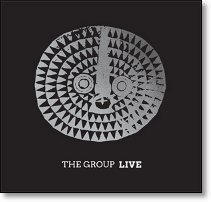 |
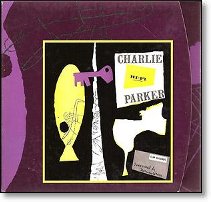 |
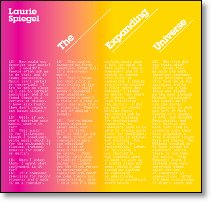 |
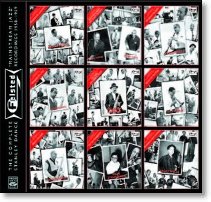 |
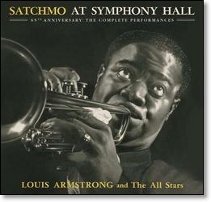 |
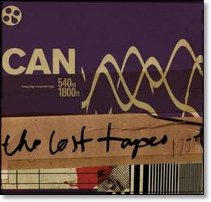 |
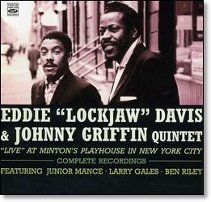 |
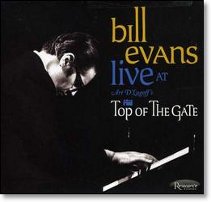 |
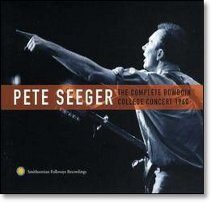 |
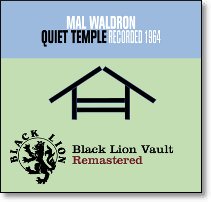 |
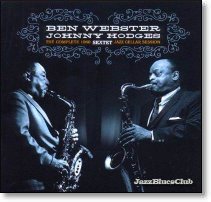 |
The Group: Live (1986 [2012], NoBusiness): The name, even with its definite article, doesn't do them justice. They came out of the New York loft scene, gigged around for a couple years, and left nothing but this newly discovered masterpiece. The booklet shows two quintet posters: their May 3 (1986?) "world premier" with Ahmed Abdullah (trumpet), Marion Brown (alto sax), Billy Bang (violin), Sirone (bass), and Andrew Cyrille; and another from Sept. 12-13, 1986, with Fred Hopkins on bass. This recording, from Sept. 13, uses both bassists. They play five pieces, with Mingus' "Goodbye Pork Pie Hat" and Brown's "La Piacita" running 18 minutes each, and Miriam Makeba's "Amanpondo" at 25 minutes. Bang manages to swing in any or no time; the two horns mesh intuitively, completing each other's thoughts; the two bassists have different strong suits, and Cyrille has rarely had a better day. A
Charlie Parker: Now's the Time (1952-53 [1990], Verve): Dumped onto CD in 1990, with "the Quartet of Charlie Parker" sketched across the front cover bottom, these two quartet sessions -- one with Hank Jones and Teddy Kotick, the other with Al Haig and Percy Heath, both with Max Roach -- appeared first on LP (MGV 8005) as The Genius of Charlie Parker, #3: Now's the Time, probably c. 1956-57, with the same song order, including back-to-back alternate takes, usually annoying but here considered the tribute such genius demands: true fans will want to examine every precious note. The CD is out of print now, supplanted by Verve's 1998 "Master Edition" -- sometimes called Hi-Fi (the words do appear on the front cover) but more often just Charlie Parker -- expanded with even more alternate takes, shuffled to the end this time, and a couple extra septet tracks.
The cult of Parker started early and has persisted largely through sheer force of iteration. I don't doubt his charisma, which is attested to from many credible sources, but I've never managed to hear him as a revolutionary, perhaps because I came to him late -- well after I had heard Ornette Coleman and Anthony Braxton -- but also because his innovations became so ordinary in such short order. (Parker's title tune was seven years old when he covered it here, already sounding tired and out of place.) I've mellowed on him as a person, no longer blaming him for jazz's abandonment of pop music -- he wasn't that significant -- nor condemning him as a moral reprobate who led others to ruin. (For one thing, he was one of the first black men in America to live his life oblivious to, if not unaffected by, white racism.) Still, his cult annoys me to no end, mostly because they insist on things I cannot hear, and when doubted all they can do is parlent plus forte. I recently referred to this as "shameless idolatry" -- a phrase which Robert Christgau, long a prime example, proudly adopted for his review of this and another dusty Parker tome. We've disagreed on Parker ever since my first sampling -- Bird/The Savoy Recordings (Master Takes) and The Verve Years (1950-51) -- in 1976, and the more I've heard, the less common ground we've enjoyed. Christgau went on to write one of the best Parker lines ever: "No one else has ever articulated so many ear-boggling, mind-exploding, stomach-churning, rib-tickling musical ideas so easily -- so brilliantly -- so insouciantly -- so passionately -- so fast." Were it only true: the clue is "no one else" because Christgau has shown virtually no interest in any of Parker's contemporaries (aside from Thelonious Monk, who easily bests Parker on at least half of those counts -- it's worth recalling that Monk wrote music no one could play, whereas in rapid course everyone was aping Parker).
I thought I'd consider this record because Christgau gave it an A+ and I hadn't heard it. Turns out it's not in print and not on Rhapsody, but it was possible to reconstruct it from tracks on the 1998 edition. One big problem with Parker is that even before you sink into the live shots and bootlegs the sound quality of Parker's studio work was rarely good and often awful, but these relatively late sessions sound fine. The two pianists are superb, the bass is nicely balanced, and Max Roach was one of the few drummers who could make bebop work. Parker himself, his death less than three years ahead and his prime more than three years past, is relaxed and fit -- I wouldn't say passionate or fast, but for once his tone warms up the opening standard ("The Song Is You") and he negotiates the changes on his own pieces impeccably well. This is, in short, the mature Parker, the sort of record he might have kept making into old age. It's just that, at 32, he already was old -- about as old as he was ever going to get. A- [R]
Charlie Parker: Charlie Parker (1947-53 [1998], Verve): Part of the Verve Master Edition series, this supplanted Verve's 1990 Now's the Time CD, a point made by placing the cover pic of the old CD on the back cover here. The remasters come from Verve's truly laborious 10-CD The Complete Charlie Parker on Verve, with the Quartets padded out to 25 cuts through the addition of vaguely related tracks -- one from 1947 is a dateline outlier, a Carnegie Hall quartet with Hank Jones, Ray Brown, and Shelly Manne -- with all the scraps shuffled to the back of the bus. In pure musical value, not a lot to favor one over the other, but despite the detritus this is the cleanest sounding Parker disc ever, and people (like me) who squirm at the grunginess of nearly everything else he recorded will appreciate that. Much improved documentation, too. A-
The Quintet: Jazz at Massey Hall [Original Jazz Classics Remasters] (1953 [2012], Debut/OJC): Invariably filed under alto saxophonist Charlie Parker's name, even though he was billed at the Toronto venue as Charlie Chan. For Parker followers, this is the most easily overrated album of all time, partly because the all-star cast -- Dizzy Gillespie on trumpet, Bud Powell on piano, Charles Mingus on bass, and Max Roach on drums -- suggests more than can possibly be delivered, and partly because this has long had pride of place as Parker's first live bootleg: an authorized boot, in fact, recorded by Mingus for the Debut label he and Roach founded, the only musician-owned label of the day. And it's been reissued promiscuously ever since, often with "the greatest jazz concert ever" slapped across the cover. It originally appeared on two 10-inch LPs, made it to 12-inch at least by 1962, and CD in 1989, and the sound was so lousy that Mingus re-recorded his bass parts. In 2003 the Spanish label Jazz Factory released Complete Jazz at Massey Hall under Parker's name, expanding the 46:07 album to 72:25. This year's OJC remaster reverts to the canonical 6-song format, with markedly improved sound and a lot of crowd ambiance. Starts with Ellington's "Perdido" vamp, runs through three Gillespie pieces, none of Parker's tunes, and he's not all that prominent. At the time, there was a Vol. 2 with just the rhythm section -- even here, Powell is the most consistent performer, and Mingus made damn well certain that you could hear the bass -- but that's largely fallen by the wayside. It seems history has followed the Dean Benedetti rule: turn the machine off whenever Parker sits out. B+(*) [R]
Charlie Parker: Complete Jazz at Massey Hall (1953 [2003], Jazz Factory): Released in Spain the moment the 50-year-limit copyright clock ran out, a sane law especially considering that all the stars are long dead. The extra minutes (72 vs. 46) mostly come from the Trio, when the horns took a break and let Bud Powell steal the show -- material that Debut had released separately at the time. The sound is more natural and open -- evidently the bass overdubs were scrubbed -- and without the rush I found myself noticing Chan more (and Gillespie less): terrific solo on "All the Things You Are"; pretty good one on "Hot House." Clearly not such a slouch as I sometimes think, and not dead yet, either. B+(***) [R]
Laurie Spiegel: The Expanding Universe (1974-80 [2012], Unseen Worlds, 2CD): Electronic music, invented at Bell Labs when they were riding high on their discoveries of the transistor, the laser, and the big band; first piece sounds like minimalism on a clavinet -- could have extended that alone indefinitely, but new concepts keep coming along, all through the first disc (matches the original 2LP) and well into the second before it settles into engagingly atmospheric. Should very likely be deemed one of the classics of its genre -- described by AMG as "Avant-Garde/Classical/Pop-Rock." A- [R]
The Paul Winter Sextet: Count Me In (1962-63 [2012], Living Music, 2CD): I have saxophonist Winter -- initially alto, but later more likely soprano -- filed under New Age, that loose agglomeration of non-swinging, non-rocking, only sometimes remotely folk-ish or world-ish or maybe even classical-ite instrumental music reputedly able to calm nerves and engender a sense of inner bliss. I have no idea whether he's any good at it: it's a category of music I actively ignore, to the extent that I expect the few good records I have filed there are misclassified. Turns out, Winter started as a Stan Kenton fan. He did a year in the army, then went to Northwestern, played in their big band, won a prize, got invited to the White House, wound up on a State Deptartment tour of Latin America, where he got a jump on the jazz samba wave. Nice package, meticulously documented with a 32-page booklet, a cherished memory, no doubt, and a minor curiosity for the rest of us. B
In Series
The Complete Stanley Dance Felsted "Mainstream Jazz" Recordings 1958-1959 (1958-59, Fresh Sound, 9CD): An important jazz critic, Dance was born in England in 1910, moved to the US in 1937. In the late 1950s he coined the term "mainstream jazz" to describe swing musicians surviving in the post-bebop world. He dabbled on the production side, and in 1958-59 brought some of his favorites into the studio to record for the British label Felsted. This looks to be a box of nine LP-replicas, no extra takes or related trivia, but remastered sound plus a 44-page booklet including revised liner notes written by Dance in the 1970s. Dance's favorite ploy was to change the bands from one LP side to the next -- how much like a critic of the day to focus on the coherence of sides. Notes on the individual albums follow. B+(***) [R]
Rex Stewart: Rendezvous With Rex (1958, Felsted): Ellington's trumpet star 1931-45, left to tour with JATP and run his own big band but never had much success; mostly octet: lush reeds and tasty guitar to bounce his cornet off of, picking up a bit on the one he sings ("My Kind of Gal") and ending with the lovely "Blue Echo." B+(**) [R]
Earl Hines/Cozy Cole: Earl's Backroom and Cozy's Caravan (1958, Felsted): One side is a quartet led by the piano great with Curtis Lowe on tenor and baritone sax; the other is a septet led by drummer Cozy Cole with no one I've heard of on tenor sax, trumpet, trombone, piano, guitar, or bass; one way the leaders prove their stature is how your ears move from the piano to the drums on the transition, but Cole loses his edge when he sit back for a blues vocal, and no one picks up the slack. B+(*) [R]
Buster Bailey: All About Memphis (1958, Felsted): This is the only LP under his name, but Bailey was one of the most important clarinetists of early jazz, starting with W.C. Handy, going on to King Oliver, Fletcher Henderson, Mills Blue Rhythm Band, and John Kirby; his core quartet "Beale Street Blues" is a sheer delight, "Memphis Blues" sneaks up on you, and for his originals, they bring in Vic Dickenson for a tailgate party. B+(***) [R]
Buddy Tate: Swinging Like . . . Tate (1958, Felsted): One of the famed "Texas Tenors," Tate joined Count Basie's band from 1939-48; he held a long (1953-74) residency at the Celebrity Club in Harlam, and starting with this album recorded dozens of examples of his ability to swing a blues -- my favorite is a 1961 date with Buck Clayton, Buck and Buddy Swing the Blues; a little unsteady on the first side, but then Clayton, Dicky Wells, and Jo Jones reunite for the second, really perking up the saxophonist. B+(**) [R]
Coleman Hawkins: The High and Mighty Hawk (1958, Felsted): This one I've heard before, on a 1988 London CD, and it looks like it's later been reissued with extra tracks; with Buck Clayton, Hank Jones, Ray Brown, and Mickey Sheen, starts with one of Hawkins' best upbeat blues, remains superb even on the slowest ballads. A- [R]
Dicky Wells: Bones for the King (1958, Felsted): One of the swing era's top trombonists, a star with Fletcher Henderson and Count Basie; first side adds Vic Dickenson, Benny Morton, and George Matthews for a trombone quartet, with an amusing vocal on "Sweet Daddy Spo-Do-O"; second side is more trad, trading lines with Buck Clayton, Rudy Rutherford, and Buddy Tate, with Jo Jones keeping time. B+(**) [R]
Budd Johnson: Blues a la Mode (1958, Felsted): Tenor saxophonist, the missing link between Coleman Hawkins and Ben Webster, and on their level -- once you're aware of him, as few people are, you'll find him everywhere; Charlie Shavers adds some fine trumpet, and Vic Dickenson and Al Sears add to the rousing septet, but on his own Johnson plays some of the most romantic tenor sax you'll ever hear; also available with a later session as The Stanley Dance Sessions (1958-67 [2005], Lone Hill Jazz). A- [R]
Billy Strayhorn: Cue for Saxophone (1959, Felsted): The saxophonist here, originally credited as Cue Porter, was Johnny Hodges, in one of the world's easiest blindfold tests; he's surrounded by regulars Shorty Baker, Quentin Jackson, and Russell Procope, with the leader on piano on one of the first of his few albums; Hodges is as sublime as ever. A- [R]
Dicky Wells: Trombone Four in Hand (1959, Felsted): More of his trombone quartet, with Skip Hall's organ (or piano) and Kenny Burrell or Everett Barksdale on guitar, sticks close to the blues base, with one vocal, where Wells and Vic Dickenson detail their tastes in women. B+(*) [R]
Briefly Noted
Louis Armstrong and the All Stars: Satchmo at Symphony Hall [65th Anniversary]: The Complete Performances (1947 [2012], Hip-O Select, 2CD): Complete comes to 119:37, a full 49:36 more than the 1996 Decca CD, which shaved a few seconds off everything, and a lot more by discarding feature spots for the All Stars -- from Jack Teagarden down to Arvell Shaw's bass solo, but mostly Velma Middleton; restoring all that reduces the real star's prominence, but also makes this show less like every other show, and more of a special event. A- [R]
Can: The Lost Tapes (1968-77 [2012], Mute, 3CD): As one only barely familiar with the Krautrock pioneer's 1972-74 peak, much of this unreleased, literally lost-and-found material defied my expectations -- not just the early blues grunge that sounds like they'd been listening to the Kinks and Them, or the quasi-Gong-meets-Beefheart nonsense, or some of the hardest rhythmic romps in instrumental rock, but even some of the synth sleeze they evolved; these things are usually for-fans-only, and I do wonder what fans think of it, but I find it unsettling -- I doubt you could whittle it down to a masterpiece, because what doesn't work is almost as interesting as what does. A- [R]
Don Cherry: Organic Music Society (1971-72 [2012], Caprice): Searching for world consciousness, or just scratching it, from "North Brazilian Ceremonial Hymn" (Nana Vasconcelos), through "Relativity Suite," "The Creator Has a Master Plan," "Terry's Tune" (as in Riley), and "Bra Joe From Kilimanjaro" (Dollar Brand), with a Turkish drummer and way too much singing. B+(*) [R]
Eddie "Lockjaw" Davis & Johnny Griffin Quintet: Live at Minton's Playhouse in New York City: Complete Recordings (1961 [2012], Fresh Sound, 2CD): Christgau credits Griffin for the first sax solo that he ever tuned into, and it's easy to back up from Griffin to Bird: he bought the whole package, especially the speed, an even meaner trick on tenor; Davis was another combative tenor saxophonist, eager to mix it up with anyone any time -- his Very Saxy, with Hawkins, Cobb, and Tate, may be the most exciting pure blowing session on record; Prestige mined these sets for four LPs, starting with The Tenor Scene, but as you see now, they never took a break. A- [R]
Bill Evans: Live at Art D'Lugoff's Top of the Gate (1968 [2012], Resonance, 2CD): Previously unreleased, one set on each disc, three songs repeated (out of eight or nine), in what turned out to be a good year for the trio -- Eddie Gomez is fully engaged, Marty Morell stays as far out of the way as Paul Motian did, and the pianist just plays and plays. A- [R]
Bill Evans: Momentum (1972 [2012], Limetree, 2CD): Another previously unreleased live trio set, a concert in Groningen, also with Eddie Gomez and Marty Morell, stretches twelve songs to 92:42; stretches a bit thin in spots, but the piano is expressive, lush even. B+(**) [R]
Coleman Hawkins: Moodsville (1960 [2003], Fresh Sound): Two 1960 albums on Crown with Thad Jones (trumpet) and Eddie Costa (piano/vibes), in 2010 remastered as The Hawk Swings: The Crown Sessions; the rhythm section swings nicely, but isn't especially engaged let alone commanding, at least by his standards; Jones closes strong, but he's never been a guy who fights for the spotlight, so it takes him a while to step up. B+(**) [R]
Little Richard: Here's Little Richard (1955-57 [2012], Specialty): First LP, rolled up his first six singles from "Tutti Frutti" through "She's Got It," all top-ten r&b, with "Long Tall Sally" his first top-ten chart hit (of only two all-time), padded by filler that sounds like Fats Domino discards -- Dave Bartholomew ran both bands; reissue tacks on two demos and a nine-minute interview with Art Rupe, where he laments not making more money off of Richard. B+(**) [R]
Hank Mobley: Newark 1953 (1953 [2012], Uptown, 2CD): Young tenor saxophonist, two years before he cut the first of his many fine Blue Notes, in a previously unreleased live set with Bennie Green on trombone and Walter Davis, Jr. on piano, working their best bop moves on the songs of the day, stretching out to 16 minutes on "Pennies From Heaven" -- the weakness in the sound just adds to the ambiance. B+(***) [R]
Charlie Parker & Dizzy Gillespie: Diz 'n Bird at Carnegie Hall (1947 [1997], Blue Note): Five quintet tracks closing with "Koko," then Gillespie brings his big band on for ten more tracks, replacing Parker with Howard Johnson and John Brown; sound is fair, enough to convey the excitement of the big band if not full detail. B [R]
Charlie Parker: Charlie Parker With Strings: The Master Takes (1949-50 [1995], Verve): Like Bix Beiderbecke, Parker was an ill-fated hick who aspired to good taste, so he thought playing with a classical string section would be the heights of sophistication; it turned out to be a formula for dreck, but at least his ballad tone had matured, and was rarely better recorded. B- [R]
Charlie Parker: South of the Border (1948-52 [1995], Verve): Early cuts with Machito's big band, small groups with bongos (José Mangual) and congas (Luis Miranda), Chico O'Farrill's overwrought 17-minute "Afro-Cuban Jazz Suite" with Mario Bauza and Chino Pozo next to Sweets Edison and Buddy Rich, Parker plays "catch up" rather than "leap ahead" and it suits him. B+(***) [R]
Charlie Parker: Big Band (1950-53 [1999], Verve): Joe Lipman arranged the first ten tracks, standards with section blare over drippy strings, the sort of thing that makes you wish for a magic button to record only the soloist -- Parker himself seems exceptionally fit; Gil Evans had a hand on the other three songs, but so did Dave Lambert, and the eleven extra takes wear out their welcome real fast. B- [R]
Charlie Parker: At Storyville (1953 [1988], Blue Note): Two live broadcasts, one with Red Garland's trio, the other a quintet with Sir Charles Thompson and Herb Pomeroy on trumpet, Roy Haynes and Kenny Clarke the drummers; came out in 1985 and totals 40:21; half Parker pieces + "Groovin' High," typical runs with little else, nothing stretched past 5:05. B [R]
Bud Powell: Jazz at Massey Hall: Volume Two (1953 [1991], Debut/OJC): Six piano trio cuts from the famous Quintet show with Mingus and Roach but no horns, padded out with another ten cuts (including outtakes) with George Duvivier and Art Taylor; "Jubilee" offers Bud at his bounciest, but much of this falls flat, such as his attempt to comp behind Mingus' "Bass-ically Speaking" solo. B [R]
Pete Seeger: The Complete Bowdoin College Concert 1960 (1960 [2012], Smithsonian/Folkways, 2CD): A folksinger who bridged the Popular Front era and the 1960s (and is still around, if you care), he has rarely seemed to relaxed, engaged, and comfortable among the people of a country that was anything but comfortable with him. A-
Jack Teagarden: Texas Trombone (1958 [2012], Black Lion Vault): Louis Armstrong never went anywhere without a great, or at least a gruff, trombonist at his beck and call, and when he put his All-Stars together, this Texas was his pick, incidentally integrating the band -- a sign of change in 1947; live at the Orpheum in Seattle, usual songbook, with Don Ewell on piano and lesser knowns, with Jerry Fuller's clarinet especially noteworthy. B+(*) [R]
Mal Waldron: Quiet Temple (1964 [2012], Black Lion Vault): Trio, originally released as Les Nuits de la Negritude, helps fill a big gap between the pianist's prolific 1950s emergence -- with Mingus and McLean, accompanying Billie Holiday and other singers, in his own trios and solos -- and his post-1970 avant-garde fruition; most pieces are built from dense rhythmic blocks, but give him a break and he's as thoughtful as ever. A- [R]
Mal Waldron: The Search (1970s [2012], Black Lion Vault): Previously unissued piano trio, two songs (one also on a 1972 Enja album), 33:24, no credits for bass-drums, may have been recorded at Montmartre Jazzhuis in Copenhagen; second piece, "Entracte," is especially strong with its piano-drums dialogue; docked a bit for lack of credits. B+(**) [R]
Ben Webster/Johnny Hodges Sextet: The Complete 1960 Jazz Cellar Session (1960 [2011], Solar): With Lou Levy on piano and Herb Ellis on guitar, aside from five "bonus tracks" where Ray Nance and Lawrence Brown drop in, with Russ Freeman on piano and Emil Richards on vibes; the sort of light blues-based thing they could do by rote, but utterly charming, as always. A- [R]
Legend: B+ records are divided into three levels, where more * is better. [R] indicates record was reviewed using a stream from Rhapsody ([X] is some other identified stream source; otherwise assume a CD). The biggest caveat there is that the packaging and documentation hasn't been inspected or considered, and documentation is especially important for reissues. But also my exposure to streamed records is briefer and more limited, so I'm more prone to snap judgments -- although that's always a risk.
For this column and the previous 103, see the archive. Total records reviewed: 3564 (3128 + 436).
Additional Consumer News
I've spent much more time listening to Charlie Parker than to I have to anyone else I basically don't much like. The following grades come from my database. The first Parker I heard was on LPs (cited above) from the late 1970s. I doubt that I played anything else by him until the early 1990s, when I started exploring jazz much more systematically. It's possible that some of the earlier grades below were excessively harsh; also possible that some of the later grades were on the lenient side, or that I gave extra credit for his undoubtable historical significance.
Parker's studio recordings were for Savoy, Dial, and Verve, roughly that order although there are post-Dial recordings for Savoy, and Verve (originally Clef, now owned by Universal and thoroughly rebranded) has snatched a few earlier recordings up. Beyond that, there are an awful lot of bootleg live recordings, most with dreadful sound, gathered up in a desperate attempt to recapture every note Bird ever blew. The ultimate example is the 7-CD Mosaic set, The Complete Dean Benedetti Recordings, where to save on recording media the machine was only turned on for Parker's solos. I haven't gone that far, nor have I sampled any of the 20 volumes of Bird Eyes on the Italian label Philology.
What I have heard follows, sometimes with brief notes (releases under Parker's name are just "--"):
- Jay McShann Orchestra: Blues From Kansas City (1941-43 [1992], Decca): front cover says, "Featuring Charlie Parker & Walter Brown"; Brown is the singer, a classic blues shouter; McShann plays piano, had a long career on the blues circuit after his territory band went bust; Parker doesn't mess up much. A-
- Dizzy Gillespie: Shaw' Nuff (1945-46 [1992], Musicraft): the quintets with Parker are the great watershed of bebop. A
- --: The Charlie Parker Story (1945 [1995], Savoy): his first studio session, famed for producing "Koko" among the six cuts; stretched out with false starts and chatter. B-
- Dizzy Gillespie/Charlie Parker: Town Hall, New York City, June 22, 1945 (1945 [2005], Uptown): B+
- --: 1946 Jazz at the Philharmonic Concert (1946 [1992], Verve): Parker dominates the cover, if not the show; cover also notes "featuring": Dizzy Gillespie, Lester Young, Coleman Hawkins. B+
- --: The Legendary Dial Masters: Volume 1 (1946-47 [1989], Stash): A-
- --: The Legendary Dial Masters (1946-47 [1996], Jazz Classics, 2CD): A-
- --: Charlie Parker Memorial: Volume 1 (1947 [1993], Savoy): originally a 1955 post-mortem best-of, later padded with false starts. B+
- Charlie Parker/Dizzy Gillespie: Diz 'n Bird at Carnegie Hall (1947 [1997], Blue Note): above. B
- --: Washington D.C., 1948 (1948 [2008], Uptown): B+(*)
- --: Charlie Parker Memorial: Volume 2 (1947-48 [1994], Savoy): B+
- --: The Genius of Charlie Parker (1945-48 [1991], Savoy): the most overused title in the catalogue (Discogs lists 31 cases), but one of the better examples. A-
- --: Original Bird: The Best of Bird on Savoy (1945-48 [1988], Savoy): A-
- --: Bird/Savoy Original Master Takes (1944-48 [1988], Savoy, 2CD): as I recall, completism hurts here, especially the ballads and vocals. B
- --: The Complete Savoy and Dial Studio Recordings 1944-1948 (1944-48 [2000], Atlantic, 8CD): on the other hand, there is something to be said for getting it all together and done with. A-
- --: The Bird Returns (1948-49 [2003], Savoy): from his Dial contract, quickly cashing in with a greatest hits live. B+
- --: 1949 Jazz at the Philharmonic (1949 [1993], Verve): another package show, with Lester Young, Roy Eldridge, Buddy Rich, and Ella Fitzgerald. B
- --: The Genius of Charlie Parker (1944-49 [2005], Savoy, 2CD): finally, a best-of that gets nearly everything right. A
- --: The Complete Live Performances on Savoy (1947-50 [1998], Savoy, 4CD): the famous Royal Roost broadcasts. B+
- --: Swedish Schnapps (1949-51, Verve): one of the hottest, best-sounding live shots. A-
- --: Bird at St. Nick's (1950 [1992], Debut/OJC): dreadful sound, just sax and drums. C+
- --: Bird and Fats: Live at Birdland (1950 [2004], Cool & Blue): with Fats Navarro on trumpet. B
- Charlie Parker/Dizzy Gillespie: Bird and Diz (1950 [1997], Verve): B+
- --: Charlie Parker With Strings: The Master Takes (1949-50 [1995], Verve): above. B-
- --: Bird With Strings: Live at the Apollo, Carnegie Hall and Birdland (1950-52 [1993], Sony): B-
- --: Charlie Parker Jam Session (1952 [1990], Verve): B+
- --: The Complete Legandary Rockland Palace Concert (1952 [1996], Jazz Classics, 2CD): the live mix works for once, dimming the background strings, bringing out the sax. A-
- --: Yardbird Suite: The Ultimate Collection (1945-52 [1997], Rhino, 2CD): pretty much all a non-fanatic needs, starting with Gillespie's great sessions, ending with Rockland, hitting the key Savoy and Dial sides along the way. A
- --: South of the Border (1948-52 [1995], Verve): above. B+(***)
- --: Now's the Time (1952-53 [1990], Verve): above. A-
- --: Charlie Parker (1947-53 [1998], Verve): above. A-
- --: Big Band (1950-53 [1999], Verve): above. B-
- The Quintet: Jazz at Massey Hall (1953 [2012], Debut/OJC): above. B+(*)
- --: Complete Jazz at Massey Hall (1953 [2003], Jazz Factory): above. B+(***)
- --: Charlie Parker at Storyville (1953 [1988], Blue Note): above. B
- Bird's Best Bop on Verve (1949-53 [1995], Verve): B+
- The Essential Charlie Parker (1946-53 [1992], Verve): C
- Confirmation: Best of the Verve Years (1946-53 [1995], Verve, 2CD): B-
- Bird [Original Motion Picture Soundtrack] (1945-88 [1988], Columbia): original solos, repackaged with new accompaniment, an historical atrocity but it solves some problems. B+(*)
Aside from The Dean Benedetti Recordings (above), the big ticket items I haven't sprung for are Bird: The Complete Charlie Parker on Verve (1946-54 [1990], Verve, 10CD) and its little brother, The Complete Verve Master Takes (1947-54 [2003], Verve, 3CD). The former is notorious for its studio padding. As for the latter, why bother when you can get just Charlie Parker and skip With Strings and Big Band.
The Savoys and Dials are rehashed periodically, with both older and later editions roughly equivalent to the ones listed, but I stopped caring after buying the complete box. Otherwise, the single Best of the Complete Savoy and Dial Studio Recordings (1944-48 [2002], Savoy) might suffice. Similarly, best of the Complete Live Performances on Savoy (1947-50 [2005], Savoy) should give you an adequate taste of the Royal Roost airshots. And to confuse things further, Savoy has a newer single best-of, Now's the Time (1945-48 [2006], Savoy) by "The Revolutionary Charlie Parker."
Christgau likes the compilation In a Soulful Mood (see update below). It looks to be about half Verve material, much more than the two A-rated compilations listed above -- not an auspicious move, but I recognize quite a few of the Verve tunes as ones I've noticed while preparing this. Another interesting looking set is Charlie Parker: The Rough Guide to Jazz Legends ([2011], World Music Network), which combines a single CD of Parker (starting with the marvelous "Red Kross" and some Gillespie but not "Shaw 'Nuff") and tacks on a second disc by Parker's bebop contemporaries -- all classic material, things you should know before getting too wrapped up in Bird.
As for the boots, caveat emptor. One retailer notes, regarding Complete Onyx Recordings ([2003], Definitive, 2CD): "Poor recordings. For rabid Parker fans only." That's so often the case.
Update: Joe Yanosik objected to my description of In a Soulful Mood as a 2-CD set. Turns out that Music Club released that title, with as far as I can tell the same artwork, three times:
- MCCD 205, in 1995, UK, 1-CD, 26 cuts; these date 1946-47, probably from Dial.
- 50003, in 1996, US, 1-CD, 18 cuts, a proper subset of MCCD 205.
- MCCD 620, in 2007, UK, 2-CD, 50 cuts, only 14 from the original edition; adds include one cut each from Jay McShann and Dizzy Gillespie, five cuts from The Charlie Parker Story (Savoy), a few more cuts that could be Savoy or Dial, and almost all of the second disc from Verve -- unless, of course, they substituted live cuts here and there.
Christgau's review gives the date as 1996, so he presumably means the US (50003) edition. I decided to mention the title when I noticed it in CDConnection's list of available Parker records, mistakenly assuming that what I had found was the same record Christgau reviewed about a year ago.
My general experience with Music Club is that their compilations are well programmed but poorly documented. I don't have any of these sets, and web info is rather limited. Christgau credits Roy Carr with programming his edition. Discogs credits Charles Waring with the liner notes to the 2007 edition. It should also be noted that Music Club has used In a Soulful Mood as a generic title for its jazz compilations: some others include Chet Baker, John Coltrane, Miles Davis, Dexter Gordon, Charles Mingus, and Mel Tormé. I'll also note that the Mingus set is on Sue Mingus's list of unauthorized recordings. That's another can of worms, but all this should raise several red flags.
Copyright © 2012 Tom Hull.